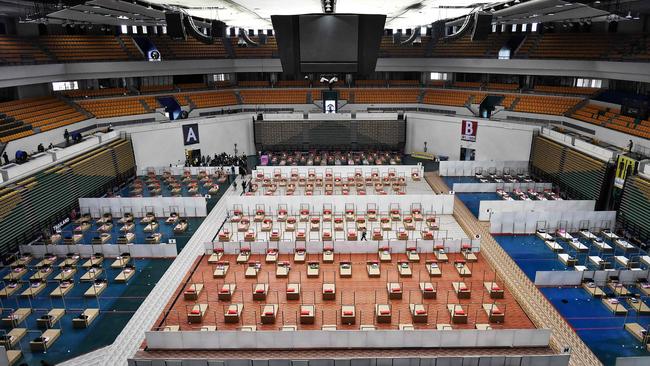New wave of COVID-19 cases sweeps across Asia
Cambodia is in lockdown, infections in Thailand and The Philippines are soaring, New Delhi and Mumbai are under curfew.

Cambodia is in lockdown, infection rates in Thailand and The Philippines are soaring, and New Delhi and Mumbai are once again under curfew as a fresh wave of COVID-19 infections sweeps the Asian continent.
Tokyo and Osaka are also poised to declare new states of emergency amid infection surges that again threaten the viability of the capital’s summer Olympics, which is due to start in July after a year’s deferral.
Hong Kong imposed a two- week ban on flights from India, Pakistan and The Philippines on Sunday after multiple cases of the voracious “double mutant” COVID-19 variant (N501Y) — that has engulfed the subcontinent were detected there in recent days.
Hong Kong authorities said all three countries would be classified as “extremely high risk” after 29 of 30 new coronavirus cases detected on Sunday were found to have been imported.
The announcement comes a week after New Zealand suspended entry for two weeks to all travellers from India, including its own citizens.
The country pushed ahead on Monday with a planned travel bubble with Australia that saw hundreds of passengers arrive in New Zealand airports.
India is now second only to the US as the world’s worst-affected nation from the pandemic, with 273,810 new infections confirmed in the 24 hours to Monday, pushing the nationwide total to more than 15 million and fatalities to 178,769. The country has recorded more than two million cases this month alone.
A lockdown was imposed across New Delhi at the weekend, with Chief Minister Arvind Kejriwal warning that the capital of 20 million faced a severe oxygen scarcity, and had less than 100 vacant critical care hospital beds left.
He urged the central government to send emergency supplies of oxygen cylinders and drugs to tackle the crisis.
“In the last 24 hours, positivity rate has increased to around 30 per cent from 24 per cent,” Mr Kejriwal told a Sunday news conference. “The cases are rising very rapidly. The beds are filling fast.”
India has already slowed exports of coronavirus vaccines as it tries to fight the new surge with mass inoculations.
At the weekend, the Home Ministry restricted the industrial use of oxygen cylinders to “meet the significant surge in demand for medical oxygen”.
The measures have severely impacted vaccination rollouts in other needy countries, including Indonesia, where Health Minister Budi Gunadi Sadikin warned on Sunday that India’s new COVID emergency must serve as a lesson against complacency.
“We must prevent the same from happening in Indonesia. We are forgetting to follow health protocols … we are starting to forget. The public is already feeling optimistic (because of vaccination) and that is making us lax,” Mr Sadikin said.
“We must apply health protocols especially during religious celebrations. We should not have big crowds or gatherings.”
The Indonesian government has technically banned the mass annual homecoming, known as mudik, for the Eid holiday that follows the holy fasting month of Ramadan, though some health experts say there are too many loopholes to prevent a new surge.
Cambodia has imposed a fresh lockdown in Phnom Penh and some satellite districts to try to contain a 10-fold COVID infection spike in a country that until recently had largely managed to contain the virus.
The new restrictions prohibit all residents from leaving home except to go to work, to buy food or for medical treatment.
In Thailand, where daily new cases have risen from just 26 on April 1 to close to 1767 on Sunday, the government has reimposed heavy restrictions including the closure of all schools, bars and nightclubs and a ban on restaurant alcohol sales.
Against that trend, The Philippines government has eased a lockdown in Manila despite daily infections rising by up to 12,000 a day — the highest rate since the start of the pandemic — and fatality rates soaring in recent weeks from 1.82 per cent to 5.36 per cent. Hospitals are at capacity in the capital, with long wait lists for admission to critical care units.
The new surge across parts of Asia coincides with major religious events. In India, hundreds of thousands of Hindu devotees continue to mass on the banks of the Ganges in Haridwar to mark the Maha Kumbh Mela festival — one of the largest religious gatherings in the world.
Hundreds of millions of Muslims are now observing Ramadan, in which they fast during the day and gather for mass prayers and feasts in the evening, while Thailand, Cambodia, Laos, Vietnam and Myanmar marked the Buddhist New Year last week with a five-day holiday.




To join the conversation, please log in. Don't have an account? Register
Join the conversation, you are commenting as Logout